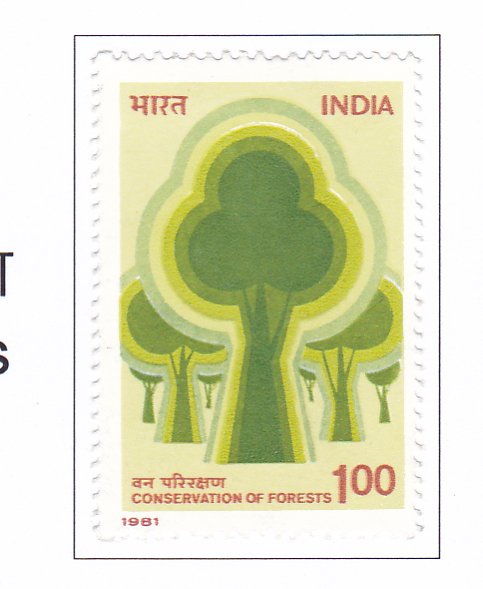Conservation of Forests

Technical Data
| Date of Issue | June 15, 1981 |
|---|---|
| Denomination | Rs. 1 |
| Quantity | 2,000,000 |
| Perforation | comb 14 x 14½ |
| Printer | Security Printing Press, Nashik |
| Watermark | No Watermark |
| Colors | Multicolor |
| Catalog Codes |
Michel IN 871 Stamp Number IN 924 Yvert et Tellier IN 672 Stanley Gibbons IN 1008 Phila-India IN 855 |
| Themes | Forests | Stylized Plants |
Environmental conservation of forests entails both the protection and enhancement of the quality of our natural environment. Natural resources like air, water, soil, flora, and fauna serve as the fundamental building blocks for national development. India stands out among nations for explicitly addressing the need for environmental protection in its Constitution. The Directive Principles of State Policy emphasize the state’s duty to protect and improve the environment, safeguard forests and wildlife, and it also calls upon citizens to play a role in environmental conservation.
Despite these constitutional provisions, environmental degradation is evident across the country due to increasing pressure on natural resources from human and animal populations. Signs of deterioration can be observed in various regions such as the sub-Himalayan tracts, the Western Ghats, forests of peninsular India, and certain coastal areas. The adverse impact of developmental projects like multipurpose river valley schemes, petrochemical refineries, fertilizer plants, and thermal power stations on environmental resources has led to public concern. While these projects contribute to economic development, they often result in environmental pollution, deforestation, and soil erosion.
To address these challenges, the Indian government established the National Committee on Environmental Planning and Coordination in 1972. Subsequently, a separate Department of Environment was created on November 1, 1980, under the Prime Minister’s charge to play a pivotal role in environmental conservation within the context of national development. This department, along with supporting organizations, is responsible for coordinating and sponsoring environmental protection programs in the country. It also supports development programs undertaken by both government and non-governmental agencies.
In recognition of the importance of environmental conservation, the Indian Post & Telegraphs Department is privileged to issue a special stamp on World Environment Day, highlighting the crucial role of forest conservation as an integral component of environmental preservation.
(Text: Courtesy of the Department of Environment, Government of India)
